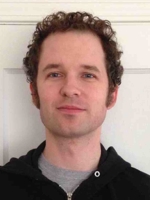Poems by Cal Freeman
Archives: by Issue | by Author Name

Heard Among the Windbreak
by Cal Freeman
From Canary Spring 2015
Cal lives and writes in Dearborn, Michigan, in the Rouge River watershed.

To bow with snow and mercury,
to stagger on shallow roots, to green
the needles on these arms and shed them,
to stand between the cold and you.
This is crop milk in a wren’s throat
with no young to feed, grass blades
and garbage gummed with spit.
In the shadow of a derrick,
this is bitterness and home.
Strung with multi-colored flags,
spruces surround the backflow ditches
where the heron drink and sicken.
Skin the saffron color of the sand,
wrinkled like the paper sack
that holds the bottle, to be an old man rolling
Beech Nut over a blue tongue (the tongue,
that bellwether of splendor and disease),
listening to the branches sigh
and the meters on the jutting pipes tick,
spine curved like a taproot, smell of sick
river in the burdock whose root tincture
is said to cleanse us of abuse. When this
was a park, children with dirt-smudged faces
would watch from the trestle bridge
as carp fought over the popcorn
and breadcrumbs sprinkled in brown water.
Now halogen light obscures dim
parabolas of stars whose names
I never knew, and razor wire glints.
To stand up while the chemicals roil
and the bedrock fractures,
to feel that and not fall, to be a soul
full of mourning doves and shudder
with startled wings as they rise.
© Cal Freeman
How to Fell a Tree of Heaven
by Cal Freeman
From Canary Summer 2015

Call it a colony of carpenter
ants, spent circuitry
of lenticel and root,
volunteer tree, sucker,
this, a tree of heaven;
cavities in rotten wood,
ailanthus altissima, Rhus
succedanea, stinking
sumac, ghetto
weed, naming
one requisite for destruction.
Press an ear to the trunk,
hear it buzz
with a thousand mandibles
Watch the chainsaw follow
pheromones into the tender
spots, break into dust
at the incision.
© Cal Freeman
In Seven Erstwhile Cities
by Cal Freeman
From Canary Fall 2015

The dead have not been delivered
their canes or walking shoes.
In two outfaced towers,
two watchers see the pulses
of bipeds in infrared
and see the lit ends of
their cigarettes with naked eyes.
In three dozen empty houses,
past scenes of trauma play
upon the walls
as if those walls were screens.
In Franco’s Spain
the spirit of the dead keeps
winning,
and it is clear to anyone
who listens
that the hillside stone
can speak.
In Laos, in the Plain
of Jars, some shattered
monuments persist
and the giants sleeping
deep within their lidless
casements savor the lack
of footsteps and the gradual
ensoulment
of unexploded ordnance.
© Cal Freeman